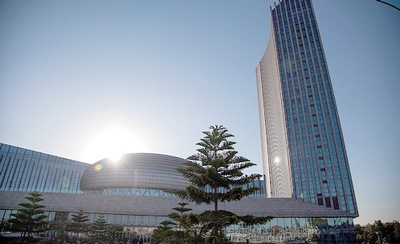
The African Capacity Building Foundation (ACBF) has reiterated its commitment to contributing to improving capacity within the continent for the success of the African Union Agenda 2063.
Speaking at a business luncheon held in Johannesburg on 30 April in preparation for the 25th Africa Union Summit - to be held in Johannesburg, South Africa, from 7-15 June 2015 - Dr Robert Nantchouang, OIC, Knowledge, Monitoring and Evaluation Department said that ACBF was fully involved in the implementation of Agenda 2063 as part of its mandate and also as a response to the request from AUC that Foundation should spearhead the capacity dimension of AU’s development blueprint.
The luncheon was organized by South African Minister of International Relations and Cooperation from South Africa, Hon. Ms Maite E. Nkoana-Mashabane.
“ACBF is currently conducting two significant studies. The first study will assess the capacity requirements for Agenda 2063 and the preparation of a capacity development plan for its implementation,” Dr Nantchouang said. “The second study explores the internal and external risks that could impede a smooth implementation of the AU Agenda 2063. ACBF will also conduct capacity needs assessments of Member States, as requested in the first 10-year implementation plan of the AU Agenda 2063.”
Results of both studies would be available in end May 2015.
With regard to the theme of the upcoming 25th AU Summit, which is “Year of Women Empowerment and Development towards Africa’s Agenda 2063”, Hon. Ms Maite E. Nkoana-Mashabane insisted on the fact that empowering women in Africa “does not mean excluding men. Women are to be integral part of AU Agenda 2063 for it to be successful”.
Dr Nantchouang informed the audience that ACBF’s current and past support had always taken into account the important role women play in Africa’s development agenda. Among the Foundation’s interventions aimed at ensuring women form an integral part of development efforts on the continent, is ACBF current support to Femme Africa Solidarité (FAS), which started in 2013 with the joint ACBF-FAS pilot study on empowering women in agriculture (EWA), conducted in six African countries.
“Agenda 2063” is an approach to how the continent should effectively learn from the lessons of the past, build on the progress now underway and strategically exploit all possible opportunities available in the immediate and medium term, so as to ensure positive socioeconomic transformation within the next 50 years. The main elements of “Agenda 2063” at the operational level are/will be outlined. At its heart, this new roadmap, emphasizes the importance to success of rekindling the passion for Pan-Africanism, a sense of unity, self-reliance, integration and solidarity that was a highlight of the triumphs of the 20th century.





